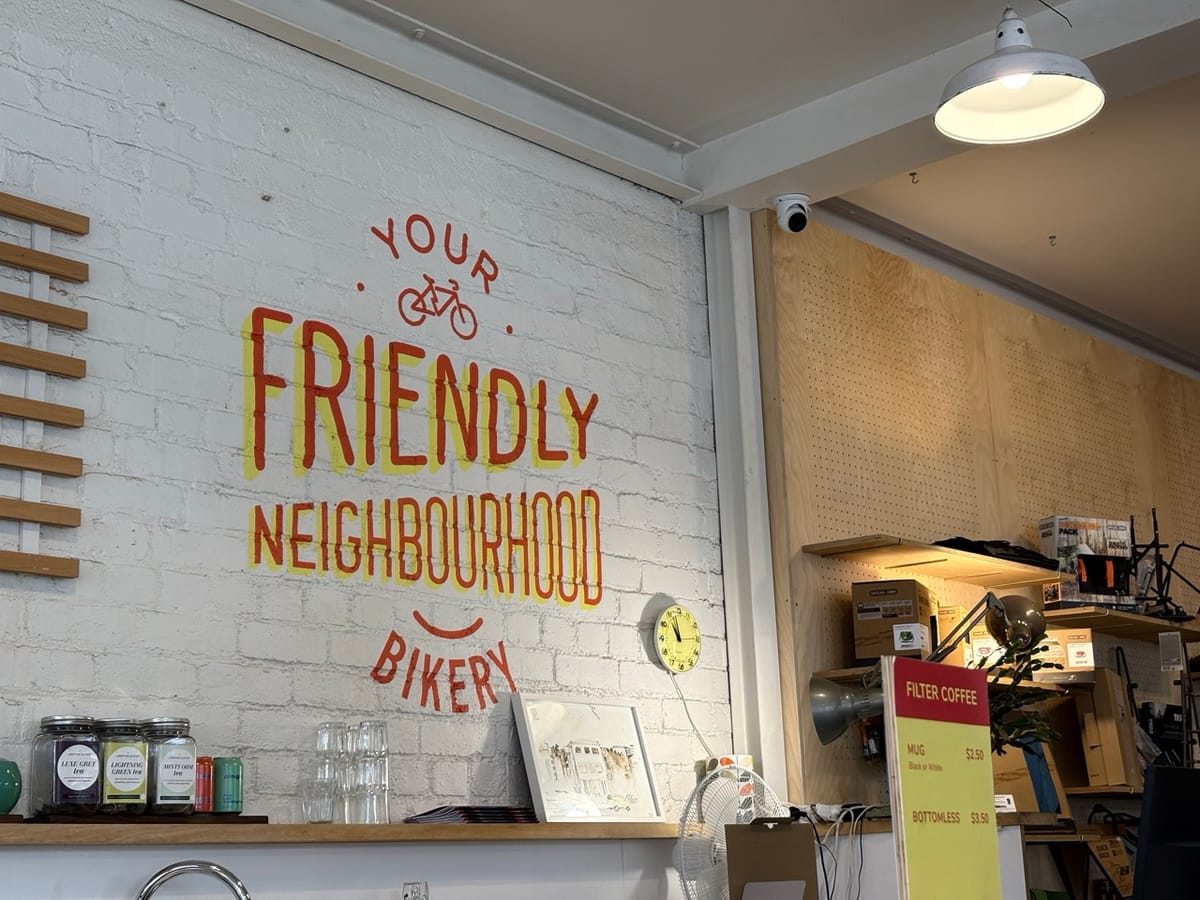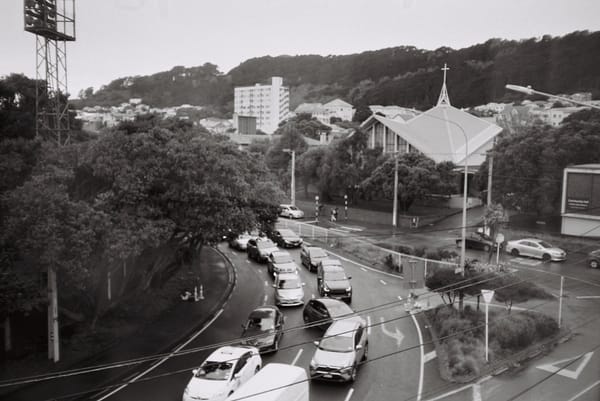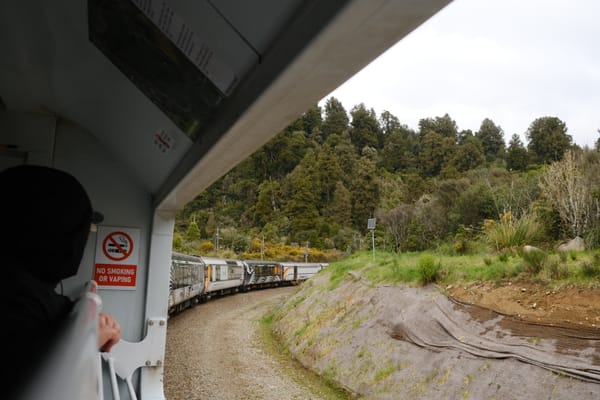From Copenhagen to the capital: meet Bicycle Junction

One of the best purchases I ever made was my e-bike three years ago. I use it nearly every day to drop off library books or cart cardboard boxes across town. It is perfect personal transport.
I count on a lovely local shop called Bicycle Junction to keep it in good condition. The self-styled friendly neighbourhood bikery is magic. Dozens of bikes of all shapes and sizes are on display within its beautiful brick walls. It was founded by Dan Mikkelsen in 2010 to be a new kind of bike shop.
Bicycle Junction’s story spans the globe from Copenhagen to the capital. It began out of love for Dan’s child and has enabled countless Wellington families to explore our town on two wheels.
Dan sat down with me on a bright and busy January day to chat Bicycle Junction, how contagious biking can be, and what he’d love to see for Wellington.
Bicycle Junction started after Dan moved back to Wellington from Copenhagen. He’s “never had a car. I didn’t need one.”
After having his first child, he “wanted to take them around by bike”. He’d tried all sorts of ways with regular bicycles you could get in New Zealand, but they weren’t really a good fit. “I wanted a cargo bike.”
If you’re around town, you’ve probably seen a cargo bike zipping past. They’re long bicycles with flat bed boxes sitting just behind the front wheel. These funky looking vehicles are a spacious and dynamic way to move things around town. They’re perfect for chaufferring your partner and child or grabbing two weeks of groceries.
Cargo bikes are commonplace in cities like Copenhagen. The iconic anarchist Freetown of Christiania makes a well-designed cargo bike that is commonplace in the Danish capital.
Unfortunately, when Dan returned to Aotearoa, cargo bikes basically didn’t exist. He knew it was perfect for carrying kids and cargo – so he tried to buy one from Denmark. They wouldn’t send him just one: he needed to buy four.
That inspired Dan to sell the extras from his garden shed. Bicycle Junction was born. It quickly grew from there.
What makes Bicycle Junction special
This space is not designed for mountain bikers. You won’t see photos of mud roaring off thick tyres. Many bike shops almost exclusively sell bikes designed to be put on a car rack, not ridden in the city. It’s intimidating for regular commuters.
Dan and the team designed Bicycle Junction to feel welcoming to people who have never cycled. There’s tables, coffee ready to drink, and a well-organised workshop to drop a bike off for servicing. Dan’s background in hospitality inspired the strategy.
It appears to be working. All kinds of people came through while I was there. An older man drank a coffee and asked about a spare part. A young couple sought biking advice. An older woman took a beautiful turquoise e-bike on a test ride. Even on a quiet day, Bicycle Junction brims with life.
A shop built for people unfamiliar with biking is vital because Kiwi kids don’t bike places anymore. In 1989, 12% of primary school kids and nearly 20% of high school kids got to school by bike. Their independence looked like a bicycle. Fast forward to 2014, and only 2-3% of school kids cycle to class.
Our whānau used to feel safe enough letting kids travel on our roads independently. Now, sharing a road with cars feels too dangerous. The steady decline in kids cycling had flow on effects: fewer people have built the confidence of biking on a road with every passing year.
Thankfully, this is the best time for new people to try a bike. Safety is dramatically improving with bike lanes, and electric bikes are revolutionising transport.
Electric bikes and protected bike lanes are starting a behavioural transformation.
Bicycle Junction’s life has lined up perfectly with a wholesale transformation of biking technology. Electric bikes are taking the world by storm, and the council is connecting the city with protected bike lanes at rapid pace.
If you haven’t tried an e-bike before, you must. These magical machines add an electric motor to help you scale hills without breaking a sweat. Experiencing an electric bike is close to pure joy. I am hooked on the high that comes with zooming around the city on my e-bike.
Electric cargo bikes are even cooler. It’s a challenge to scale Wellington’s hills without electric assistance, especially with two kids in tow. An electric motor on a cargo bike makes travelling nearly effortless. They’re the cost of an old petrol car with nearly zero fuel costs or parking purgatory.
“Electric motors changed the game,” Dan told me. “Cargo bikes weren’t a big part of the business until electric motors came on.”
E-bikes are a hit with eco-conscious people. Now, the rapid construction of bike lanes are inspiring regular people to try cycling.
Dan and the team have seen “waves of suburbs” visit the shop after their bike lanes open. “[conversations] start at the schoolgate and spread organically.” More parents are getting their kids to school by cargo bike. That helps other families see biking as normal.
The social sciences call this phenomenon “behavioural contagion”. People are social creatures, and we have different levels of comfort being outside the norm. Some, like Dan, are happy to use a cargo bike when literally nobody else is. Early adopters, like me, will try something abnormal if it fits their values. Most people won’t change their habits until it feels normal.
I love Dan’s analogy for this phenomenon: “We were the first person on the dance floor. Then came the greenies. Now we’re starting to see the more mainstream.”
Gone is the dominance of lycra-clad athletes: our bike lanes protect families, students, and commuters. Before the new network, regular people didn’t feel safe enough to try biking. As biking becomes safer, more people will try it, and the “dance floor” will fill up.
Dan’s mission is to fill up the dance floor by making cycling desirable. “We’re not telling anyone you should do this… [we] try and make you want it.” That’s why the shop runs events beyond the bikery’s walls. Bicycle Junction paired up with Gardens Magic to help more people get to the Botanics by bike. Parking is scarce there now: it’s never been a better time to safely cycle there with others.
Wellington deserves a quality bike network like Copenhagen, where Dan’s first cargo bikes were built. When I visited Copenhagen, hundreds of thousands of people commuted on two wheels. That city is flooded with bikes.
If Wellington continues to model Copenhagen, everyone will benefit. Yes, even drivers.
Dan tells me “You can drive in that city without getting stuck in traffic.” That’s because so many people bike, which means car lanes aren’t congested. “[bike lanes help drivers] so you can drive your car without getting in traffic.”
Dan’s favourite part about cycling our city is experiencing the coast. Our coastlines are stunning. You can’t beat the seaside sights and smells on a ride. I’ve worked on the coast for years: it’s an unmatched commute. The more our city invests in cycling, more people will get to experience that same ecstasy.
With the power of e-bikes, safer lanes, and cool bike shops like Bicycle Junction, it’s easier than ever to bike in Wellington. So, follow Dan’s lead. The dance floor is waiting to be enjoyed.





